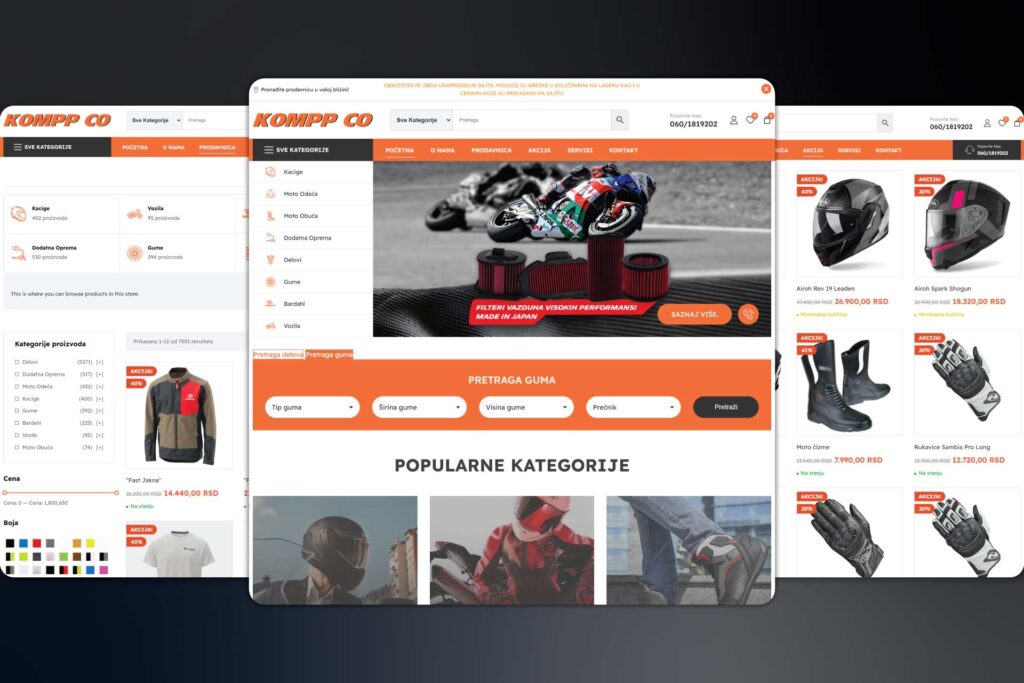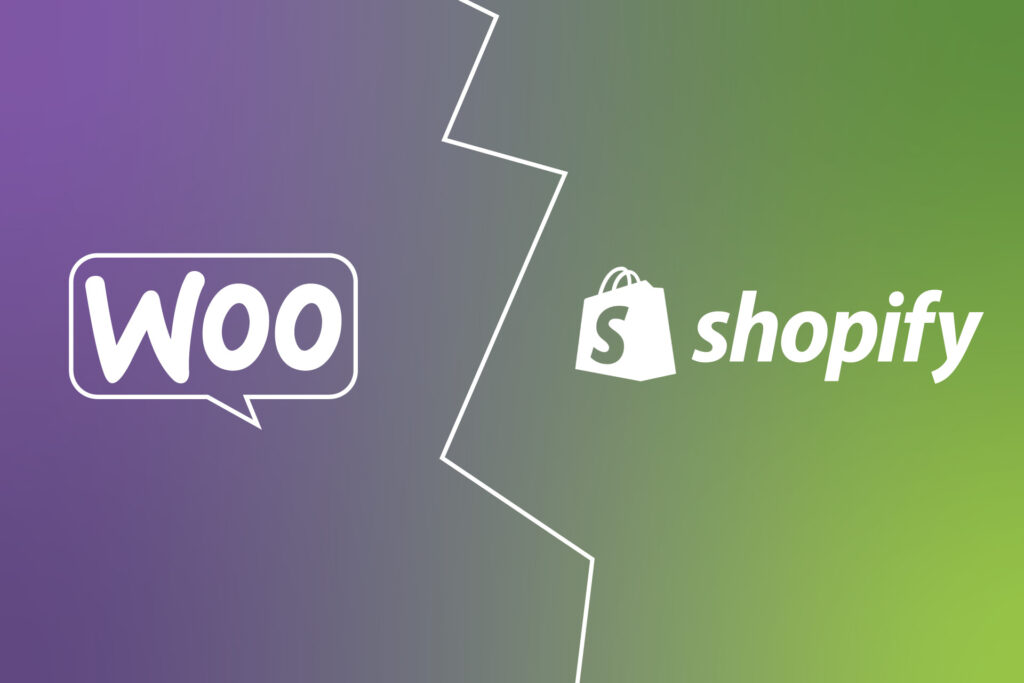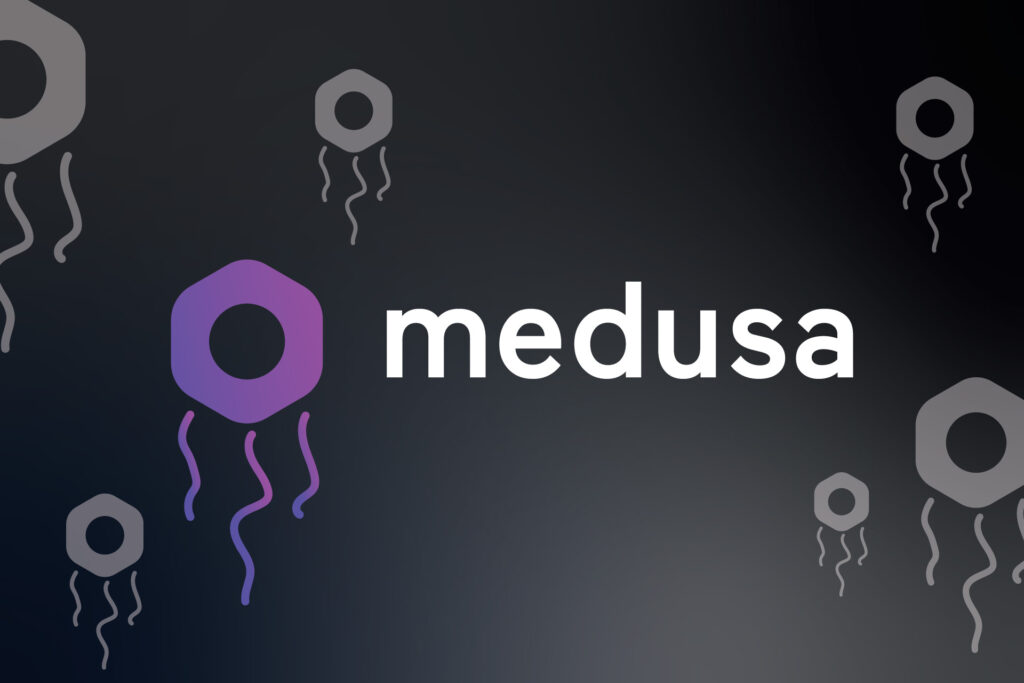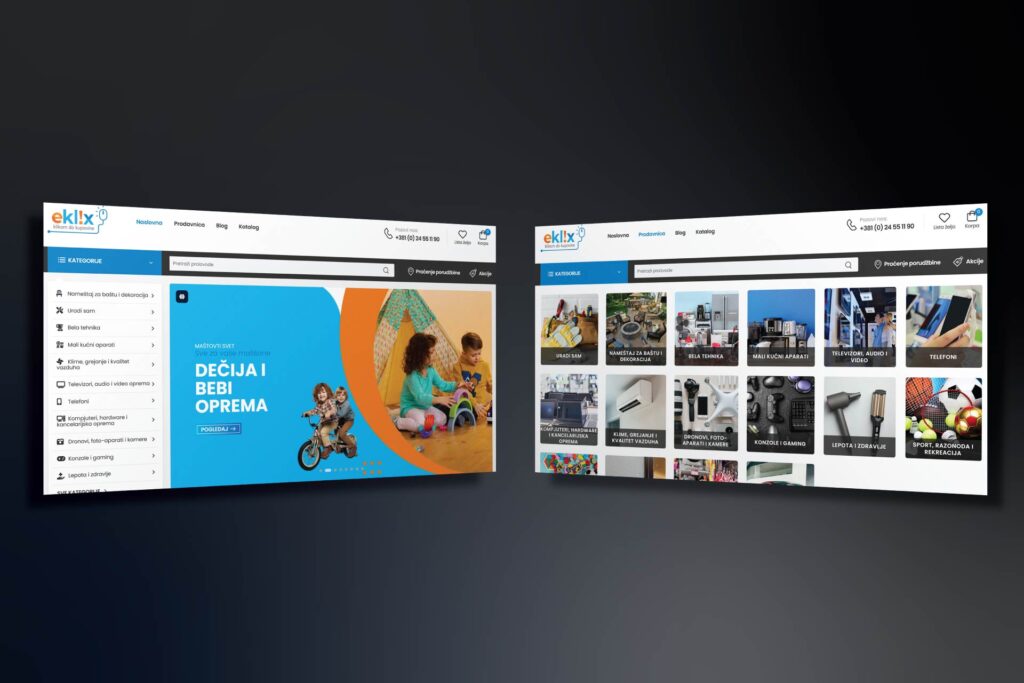An increasing number of entrepreneurs recognize the importance of online sales but often face the question:
How to create an e-commerce website that suits their needs?
With this blog post, we aim to address all your concerns regarding web shops and help you choose the right solution for you and your business.
There are two main approaches to creating an e-commerce website:
- Popular e-commerce platforms such as WooCommerce and Shopify.
- Custom solutions that offer complete flexibility, like MedusaJS and headless architecture principles.
Which approach is right for you depends on your business needs and the budget you have available. Both options come with advantages and drawbacks.
In the rest of this post, you will learn about them and choose the best fit for you.
Popular Platforms: A Quick and Simple Solution
For those who want to launch an online store quickly and easily, traditional platforms offer ready-made solutions.
- WooCommerce is an ideal choice for WordPress users, allowing seamless integration with an existing site.
- Shopify provides a fully hosted solution that requires no technical knowledge.

What is WooCommerce?
WooCommerce is a free WordPress plugin that offers full control over the appearance and functionality of your store.
For example, if you have a WordPress blog and want to add a store, WooCommerce allows for easy integration.
However, it requires technical maintenance—updating plugins, optimizing website speed, and ensuring security measures.
What is Shopify?
Shopify, on the other hand, is a fully hosted solution that allows you to launch a store without technical knowledge.
For example, if you want to sell handmade jewelry quickly without worrying about servers and updates, Shopify offers ease of use and 24/7 support.
However, it comes with monthly subscription fees and limitations in customization compared to WooCommerce.
WooCommerce vs. Shopify: Which Solution is Better for Your Online Shop?
If you want to launch an online store quickly and easily, WooCommerce and Shopify are the most popular options. However, both have their pros and cons.
WooCommerce – Flexibility for Existing WordPress Sites
WooCommerce is a free WordPress plugin that turns your site into an online store.
It’s ideal if you already use WordPress and want full control over your store’s design and features.
Why Choose WooCommerce?
- Complete customization – Thousands of themes and plugins let you create a unique store.
- No monthly fees – WooCommerce is free; costs depend on hosting, plugins, and maintenance.
- SEO benefits – WordPress is powerful for SEO, helping your store rank better in search results.
- Multiple payment integrations – Supports Stripe, PayPal, bank transfers, and more.
For example, if you already have a WordPress blog about healthy eating and want to add an online store for organic products, you can simply install WooCommerce, customize the design, and start selling.
Neophodno je napomenuti i da sam wordpress nudi dosta alata i mogućnosti putem kojih može da se napravi custom WooCommerce.
Is WooCommerce Right for You?
WooCommerce is great for:
- WordPress site owners who want to add an online store.
- Those who want full control over design and features.
- Those who prefer flexible costs instead of fixed monthly subscriptions.
Examples of Online Stores Created in W3 Laboratory
At W3 Lab, we create fully customized e-commerce stores that are not only visually stunning but also optimized for sales.
Unlike many solutions on the market, we don’t use pre-made or purchased themes. Each website is built from scratch, with custom designs tailored to the brand, users, and business goals.
Here are some of our projects:
People Like Us – Luxury Fashion Brand
People Like Us – A modern online store that helped the brand sell out its collections. Now preparing to enter the U.S. market.

Hackstons – Luxury Beverage Sales
Hacktons is a company that specializes in selling rare whiskeys, fine wines, and premium Scotch casks.

Kompp Co – Motorcycles and Accessories
Kompp Co is a company established in 2002, specializing in the import and sale of motorcycles, scooters, moto equipment, and parts.
Their range includes world-renowned brands such as Bardahl oils, Airoh helmets, and Bering gear. They also provide vehicle servicing and participate in moto events in Serbia.

Shopify – A Quick and Easy Solution Without Technical Maintenance
Shopify is a fully hosted e-commerce platform, meaning you don’t have to worry about servers, security, or technical maintenance—it’s all taken care of.
Why Choose Shopify?
- Ease of use – Perfect for those with no technical knowledge; simply sign up, add products, and start selling.
- Speed and security – Shopify hosts your store on fast servers and ensures transaction security.
- Built-in payment and shipping options – Comes with tools for billing, taxes, and logistics.
- 24/7 support – The Shopify team is always available to assist.
For example, if you want to open an online clothing boutique but lack technical skills, Shopify allows you to choose a theme, add products, and use built-in payment and shipping tools—all without additional setup.
Is Shopify Right for You?
Shopify is ideal for:
- Those who want to start selling quickly without technical maintenance.
- Entrepreneurs looking for a simple solution with built-in sales tools.
- Those willing to pay a monthly subscription ($29/month and up) for stability and support.
WooCommerce vs. Shopify – Pros and Cons
One of the biggest drawbacks of Shopify compared to WooCommerce is the cost of monthly subscriptions and additional fees.

1. Cost
Shopify has monthly subscriptions that start at $29 per month (Basic plan) and can go up to $299 per month for advanced options.
Additionally, extra transaction fees apply (if you do not use Shopify Payments), which can significantly increase costs, especially if you have a high sales volume.
WooCommerce, on the other hand, is free for basic use, while costs may arise from hosting, premium themes, and plugins.
If you already have a WordPress site, the additional cost can be minimal compared to Shopify subscriptions.
2. Customization limitations
Shopify provides a simple solution with predefined options for design and functionality, but if you want to go beyond those limits, you will have to rely on the app store or plugins, which can further increase costs.
Additionally, Shopify apps can sometimes be more expensive compared to plugins available for WooCommerce.
WooCommerce allows full control over the code and design since it is open-source. This means you can implement any functionality without additional costs for apps or fees, provided you have the technical resources to handle customization.
You should keep in mind that WooCommerce’s stability largely depends on WordPress stability, and incorrect plugin installation or modifications in WordPress itself can damage WooCommerce and disrupt the purchasing process.
3. Flexibility and scalability
While Shopify offers a stable platform, WooCommerce provides much greater flexibility for expanding your site in the future.
With WooCommerce, you can fully customize both the frontend and backend, meaning you can add specific functionalities according to your business needs.
Shopify is stable for standard stores, but if your store becomes highly specific and requires additional functionalities, you may encounter limitations in customization and high costs for necessary add-ons.
Shopify is great for a quick start, but if you need more control, flexibility, and lower costs, WooCommerce is often the better choice, especially for entrepreneurs who want scalability and adaptability in long-term planning.
Custom Web Shop Development: Flexibility and Long-Term Sustainability
Custom solutions are the best choice for those who want complete control over their online store and plan for long-term growth.

MedusaJS is an open-source e-commerce system that enables the creation of fully customized stores using modern technologies.
For example, if you have specific business requirements, such as unique payment processes or advanced user experience personalization, MedusaJS gives you the freedom to implement them without the limitations of typical platforms.
Headless architecture further enhances flexibility by separating the frontend and backend of the store.
This means you can use different display technologies (React Native, Flutter) while keeping the backend stable and powerful.
For example, if you want to sell through both a mobile app and a website simultaneously, the headless approach allows seamless integration with both platforms without compromising performance.
MedusaJS and headless architecture are ideal for large and complex projects that require maximum customization and scalability.
MedusaJS – A Flexible Open-Source E-Commerce Solution
MedusaJS is an open-source headless e-commerce system that enables fully customized stores using modern technologies.

Unlike popular platforms like WooCommerce or Shopify, MedusaJS uses a modular architecture, meaning that each part of the system can be customized or expanded according to the business’s needs.
For example, if you need custom payment processes or advanced user personalization, MedusaJS gives you the freedom to implement them without platform limitations.
Why Choose MedusaJS?
- Full code control – Developers can customize features without restrictions.
- Headless approach – Use any frontend technology (React, Vue.js, Next.js) and connect via API.
- Fast integration with third-party tools – Seamless connection with payment systems (Stripe, PayPal), couriers, CRM tools, and more.
- No monthly fees – Unlike Shopify, MedusaJS is free; costs depend only on hosting and integrations.
For example, if you sell luxury watches and need:
- A custom website design
- A mobile app connected to the same backend
- Fast order processing and Stripe payment integration
Instead of using Shopify (which has customization limits), MedusaJS allows full control with a Next.js frontend and integrated payment, shipping, and marketing systems.
Is MedusaJS the Right Fit for You?
If you need flexibility, customization, and a headless architecture without monthly fees, MedusaJS is the perfect solution.
MedusaJS is ideal for:
- Brands needing full control over their store.
- Companies looking for scalable solutions without platform restrictions.
- Developers and startups who want to build e-commerce products with modern technologies.
MedusaJS brings the power of enterprise solutions without the costs and limitations – ideal for the future of e-commerce.
What is Headless Architecture?
Headless e-commerce separates the frontend and backend, connecting them via API.
Unlike traditional platforms where the frontend (website appearance) and backend (data, orders, payments) are connected into a single system, the headless approach separates them and connects them via APIs.
This means that the backend (e.g., MedusaJS, Shopify Plus, Magento) is used for data management, while the frontend can be any technology such as Next.js, Nuxt, and React Native/Flutter, which are SEO-friendly.
Advantages of Headless E-Commerce
- Faster loading times – Improves user experience and SEO.
- Greater flexibility – No design or functionality limitations.
- Omnichannel sales – Use the same backend for web, mobile apps, and even physical stores.
For a future-proof e-commerce store, headless solutions like MedusaJS provide the best scalability and customization.
Disadvantages of Custom Websites
One of the disadvantages is the higher initial investment, as these websites are more expensive than WordPress websites.
For creating custom e-commerce websites, you need to hire the right experts who have experience in building online stores and are skilled in working with various technologies like Medusa.js, React Native, Flutter, and others.
You may be interested in: When is the right time for website redesign?
Examples of Custom E-commerce Websites from Our Lab
Eklix – An online store that sells furniture, home appliances, small household gadgets, televisions, phones, computers, drones, and many other items.
This custom e-commerce site was built using the MedusaJS platform for the backend and Next.js for the frontend.

How to Choose the Best Solution for Building an eCommerce Website?
If you’re looking for a quick and easy solution, WooCommerce and Shopify are great for starting.
However, if you have specific requirements and plan long-term expansion, custom website development using MedusaJS and headless architecture offers complete flexibility and top-tier performance.
Whether you choose a popular platform or a custom approach, it’s crucial to define your business’s needs.
Building an online store website requires careful planning, and the right platform choice can make the difference between an average and a highly successful online business.
So, choose wisely. We’re here to help you with your selection.
We are here to help you choose the best eCommerce website for you.





